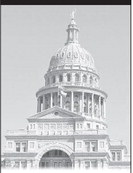TEXAS PRESS ASSOCIATION
STATE CAPITAL HIGHLIGHTS
Gov. Greg Abbott last week signed a $1 billion privateschool voucher bill into law in front of a large crowd at the Governor’s Mansion, the San Antonio Express-News and other media outlets reported. Abbott called the new law the biggest legislative win of his time in the governor’s office and touted the new program as the largest in the nation.
“Today is the culmination of a movement that has swept across our state and across our country,” Abbott said. “It’s time we put our children on a pathway to have the No. 1-ranked education system in the United States of America.”
The new voucher law will give Texas students $10,000 a year that can be used toward private school tuition, tutoring, textbooks and other educational expenses.
Abbott was joined on stage by U.S. Sen. John Cornyn, Lt. Gov. Dan Patrick, House Speaker Dustin Burrows and several private school leaders. Meanwhile, across the street from the mansion, Democratic legislators, union officials and public educators gathered to express their opposition to vouchers.
Bail crackdown bill struggling in the House
Another of Abbott’s priorities is facing stiff opposition in the House from enough Democratic members to jeopardize its passage, according to the Houston Chronicle. The bail-crackdown bill would prohibit pretrial release of defendants accused of certain violent offenses. In addition, voters would have to approve it as a constitutional amendment.
As of late last week, not enough Democrats support the bill, which requires passage by a supermajority. At least 12 Democrats would have to side with Republican legislators for the bail bills to pass. Senate Joint Resolution 5 would allow judges to deny bail to anyone accused of a violent crime or sexual offense, while Senate Joint Resolution 1 would prevent judges from granting bail for undocumented immigrants charged with a felony.
“This is not a right or left issue,” Abbott said. “This is not and should not be a Republican or a Democrat issue. This is a public-safety issue, plain and simple.”
Both measures easily passed the Senate in February.
House Democrats assail the proposals as unconstitutional and have offered alternative bail reform proposals.
State may restrain new large-energy users
The Electric Reliability Council of Texas predicts the state’s energy needs will nearly double in six years, The Texas Tribune reported, prompting one West Texas legislator to sponsor Senate Bill 6. That measure, sponsored by state Sen. Phil King, R-Weatherford, would put guardrails on the state’s energy market meant to help ERCOT better forecast future electricity needs.
“We do not have accurate load forecasting. No one knows if the forecast is real,” King said. Large companies, he added, are requiring ERCOT to plan “for load growth at dramatically higher levels than experienced ever in the history of Texas, and frankly, ever in the history of the United States.”
King said that without credible data the state runs the risk of either overbuilding, leading to higher rates for consumers in order to finance the expansions, or underbuilding and risking grid failure. His bill has already passed the Senate and is now before a House committee.
Parasite could pose risk to Texas cattle
A flesh-eating parasite found in an infected cow in Mexico has prompted the U.S. Department of Agriculture to warn states along the southern border to monitor livestock and pets for signs of the New World Screwworm, a fly that was eradicated in this country in 1966 through use of sterile male flies to stop propagation.
However, confirmed cases of cows infected with the screwworms are being found spreading northward from Central and South America. The Austin American-Statesman reported imports of Mexican livestock into the United States were halted last November for three months. Imports restarted in February after increased sterile fly deliveries and surveillance increased.
Bill would create parental advisory councils for school libraries A Senate bill already passed that would require all Texas school boards to establish library advisory councils to vet books in school libraries drew criticism at a House committee hearing, the Statesman reported. Critics say the councils would make it nearly impossible for districts to buy new library books and would give too much power to small groups of parents.
The councils would identify books with “indecent” or “profane” content and could also nix materials they deem “harmful” or “inconsistent with local community values.” Several people testifying at the House hearing called SB 13 an “overreach that would pave the way for discriminatory book removals.”
Borders is a veteran awardwinning Texas journalist. He published a number of community newspapers in Texas during a 30year span, including in Longview, Fort Stockton, Nacogdoches, Lufkin and Cedar Park. Email: [email protected].

.jpg)


